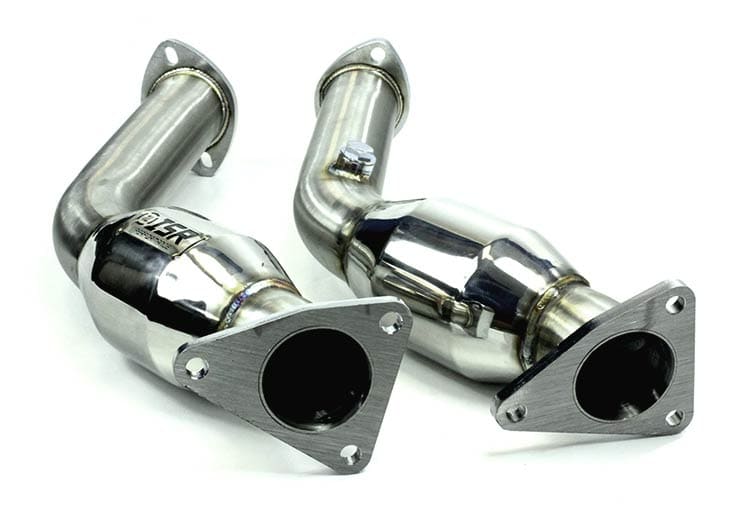Nissan 370Z ownership can be a thrilling experience for car enthusiasts. With its high-performance V6 engine, sporty design and nimble handling, the 370Z provides exciting fun. However, those who prefer more sound, performance and response, modification is the most natural step. One of the most sought-after upgrades is fitting the test pipes on the 370 Z, which adds to the horsepower, improves the exhaust sound, and makes the vehicle more aggressive.
This guide will enlighten you on all you have to know about test pipes, what they are, how they work, their advantages and disadvantages, as well as whether they are the right answer to your Nissan 370Z or not.
What Are Test Pipes for 370Z?
The test machines are aftermarket exhaust devices that substitute the stock catalytic converters. The factory cat converters assist in cutting down harmful emissions, although they also stop airflow. Removal of the restricting exhaust pipes removes the exhaust gases at a freer rate, so the overall performance is improved by replacing them with test pipes.
Test pipes are among the most evident modifications that Nissan test pipes owners can make since they will expose the horsepower and give a sporty exhaust sound. Their sound preference can choose them in resonated and non-resonated variants, providing a choice to the driver.
Benefits of Installing Test Pipes on a Nissan 370Z
The installation of test pipes has multiple benefits that present it as one of the best transformations in the 370Z. In the first place, they increase horsepower and torque by lowering back pressure, which allows the engine to breathe easier. Depending on other accommodative modifications, drivers experience an increase in horsepower of 5-10.
The other big advantage is improved exhaust note. The VQ37VHR sounds sporty already and with these test pipes, you can get that more guttural sound when it comes to turning heads on the road in the form of a deep, raspier tone. A good number of drivers also observe improvement in throttle response and the car feels and seems faster and more involving.
Types of Test Pipes for 370Z
In selecting test pipes for 370Z, you will encounter two basic classifications of the pipes: resonated and non-resonated. Resonated test pipes are made with oxygen-reducing resonators built in and tend to sound less raspy in the exhaust. They are less harsh, sounding smoother and still enhance performance.
Conversely, there are the non-resonated test pipes that are straightforward straight-through in terms of design and lack control of sound. These provide optimum performance and the highest sound but may occasionally result in a drone or a rasp. Your decision should be based on how important you consider the loudest and stiffest sounding instrument or a purer, more refined tone of sound.
Installation Process: What to Expect
Installing test pipes on a Nissan 370Z is fairly simple but takes a little bit of mechanical expertise. It is done by detaching the stock catalytic converters with the aid of aftermarket test pipes. Most kits are supplied with the required gaskets and fastening.
It is possible to perform the installation of the exhaust systems at home, in case one has enough experience to do that with some tools. But installation by a professional offers a better guarantee of fitment and location of the oxygen sensors. The average cleaning time is 2-3 hours for a typical installation.
Legal and Environmental Considerations
Legality is one of the most essential aspects people should know about test pipes. Test pipes are not street legal in many areas because they cut out the catalytic converters. This is because there are catalytic converters needed to cut down emissions and it would render these cars unable to pass the emissions test when they are removed.
Test pipes should only be used on off-road or track. They may cause the imposition of fines or inspection failure in cases where the area has strict emissions laws and you use them on the roads. Before you install them, always ensure you check the local regulations.
Potential Downsides of Test Pipes
While test pipes deliver impressive performance benefits, there are some downsides to consider. Without catalytic converters, the car may produce a stronger exhaust smell. Some owners also experience drone or raspiness, especially with non-resonated test pipes.
Another common issue is the check engine light (CEL). Since the oxygen sensors expect to read emissions data from catalytic converters, removing them may trigger a CEL. Many drivers fix this by using O2 sensor spacers or through ECU tuning.
Being aware of these drawbacks helps you decide if test pipes are the right modification for your driving style and location.
Choosing the Right Test Pipes for Your 370Z
When buying test pipes, quality and fitment are key. Here are some factors to consider:
- Material: Stainless steel is durable and resistant to rust.
- Fitment: Ensure they are designed specifically for Nissan 370Z models (2009–2020).
- Resonated vs Non-Resonated: Choose based on your preference for sound and comfort.
- Brand Reputation: Established brands like ISR Performance, Berk Technology, Z1 Motorsports, and Megan Racing are popular among 370Z owners.
- Warranty: Some manufacturers offer warranties, giving you added peace of mind.
Conclusion
Among Nissan 370Z enthusiasts who want to take the performance of their car to a different level, test pipes 370Z are one of the most gratifying adjustments they can make. In exchange, you get more HP, a more aggressive, louder sports car-style exhaust note, and a more responsive throttle, at an affordable price.
Nonetheless, drivers should not Pakistan WhatsApp Number List overlook the cons as well, which would be the aspect of it being illegal, possible check engine warning signals, and increased exhaust odors. In case they are not of concern, and you are seeking top performance, then test pipes are a superb option.





























